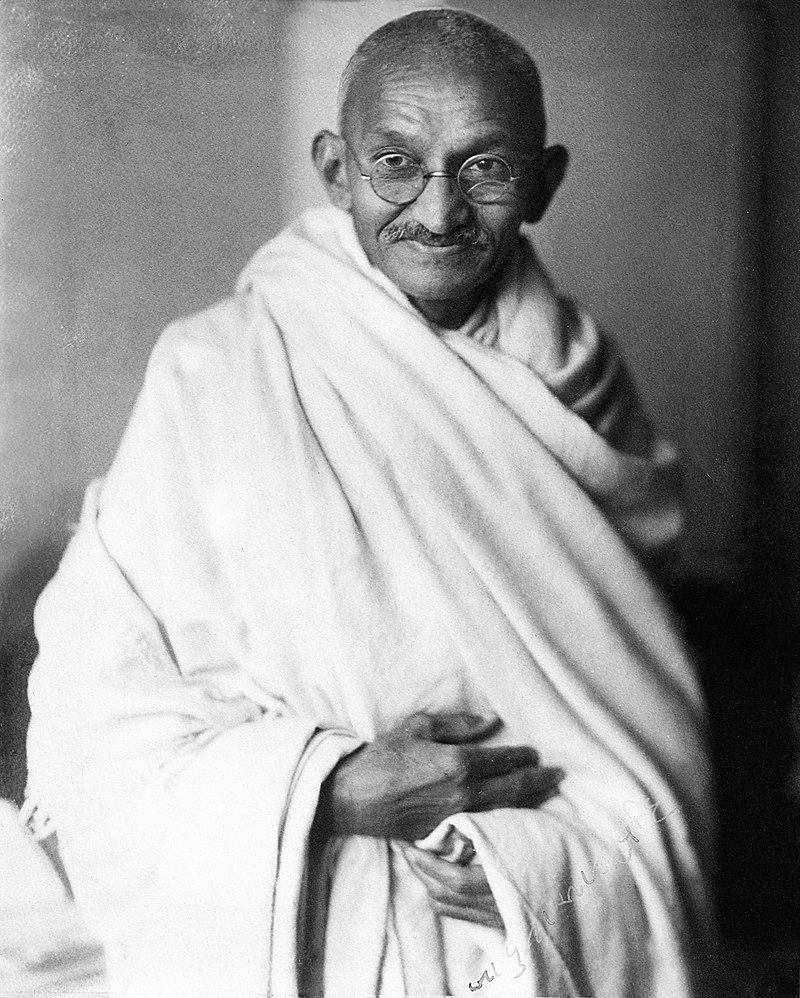Gandhi and the Transformative Power of Ahimsa

Credit: Elliott & Fry
| Giver: | - |
|---|---|
| Receiver: | - |
| Gift: | - |
| Approach: | Philanthropy |
| Issues: | 1. No Poverty, 12. Responsible Consumption and Production, 16. Peace, Justice and Strong Institutions, 8. Decent Work and Economic Growth |
| Included in: | Kindness and Generosity |
Mohandas Karamchand Gandhi (1869-1948) – better known by his honorific title, Mahatma (from Sanskrit, meaning ‘great soul’) Gandhi – was an Indian lawyer and nationalist who helped lead India to independence from British colonial rule in 1947. Gandhi embodied a moral philosophy devoted to the ancient Indian ideal of ahimsa (non-violence), an expansive principle of non-harm to all living beings. Ahimsa calls for refrainment from violent action, as well as from violent speech and attitudes such as lying, hatred, ill will and callous disregard toward others. Gandhi’s political and economic thought hinged on his belief in the transformative power of _ahimsa _to inspire voluntary self-sacrifice for the greater good of society as a whole.
In the struggle for Indian independence, Gandhi promoted satyagraha (‘truth-force’), a campaign of nonviolent resistance that called for Indians to defy the colonial authority with boycotts, labor strikes, peaceful demonstrations, fasting and other acts of civil disobedience and non-cooperation. A radical and rigorously disciplined form of social protest that inspired Martin Luther King, Jr. (1929-1968) in his leadership of the American Civil Rights Movement, _satyagraha _seeks to achieve its goals through conversion, using love and patient self-suffering to awaken the humanity of the oppressor.
Beyond the goal of swaraj (or democratic home rule), Gandhi envisioned a sarvodaya (universal uplift or benefit) society in which a collective spirit of truth, non-violence, love, cooperation and self-sacrifice would bring about social equality and the welfare of all. With human dignity and freedom as its core objectives, the _sarvodaya _society requires a level of moral development whereby individuals value the good of the whole over personal gain.
Intrinsic to this vision was Gandhi’s belief that the world contained enough abundance to meet the basic material needs of every person. As such, he saw extreme disparity of material wealth as a form of violence that degrades both the rich few and the impoverished masses, sowing seeds of fear and resentment that are antithetical to the flourishing of a peaceful democracy.
To achieve a more equitable distribution of wealth, Gandhi proposed a doctrine of Trusteeship, wherein the rich would voluntarily relinquish ownership of their wealth, agreeing to serve instead as stewards responsible for administering resources fairly for the benefit of all. As he explained in Harijan in 1947, trusteeship was based on the premise that “Everything belonged to God and was from God. Therefore it was for His people as a whole, not for a particular individual. When an individual had more than his proportionate portion he became trustee of that portion for God's people.”
Gandhi presented trusteeship not as an ideology or a program, but rather as a set of core values, an attitude that must be adopted to realize sarvodaya. He also recognized that trusteeship, like nonviolence itself, would be difficult to achieve. Yet his belief in its possibility stemmed from his faith in the basic goodness of humankind, as well as the capacity of individuals and classes to reform themselves, or experience a change of heart, for the wellbeing of all.
Contributor: Erin Brown
| Source type | Full citation | Link (DOI or URL) |
|---|---|---|
| Publication |
Bakshi, Ranji. “Trusteeship: Business and the Economics of Wellbeing.” Gateway House Research Paper No. 10. Mumbai: Gateway House: The Indian Council on Foreign Relations, 2016. |
https://www.gatewayhouse.in/trusteeship-business-and-the-economics-of-well-being/ |
| Publication |
Balch, Oliver. “The Relevance of Gandhi in the Capitalism Debate.” The Guardian, January 28, 2013. |
https://www.theguardian.com/sustainable-business/blog/relevance-gandhi-capitalism-debate-rajni-bakshi |
| Publication |
Chakrabarty, Bidyut. “Universal Benefit: Gandhi’s Doctrine of Trusteeship: A Review Article.” Modern Asian Studies 49, no. 2 (2015): 572–608. |
http://www.jstor.org/stable/24495414 |
| Publication |
Ghosal, A. K. “Sarvodaya: Gandhian Philosophy and Way of Life.” The Indian Journal of Political Science 20, no. 1 (1959): 23–30. |
http://www.jstor.org/stable/42743494 |
| Publication |
Nanda, B R. “Gandhi and Non-Violence: Doctrines of Ahimsa and Satyagraha.” World Affairs: The Journal of International Issues 6, no. 1 (2002): 54–62. |
http://www.jstor.org/stable/45064841 |